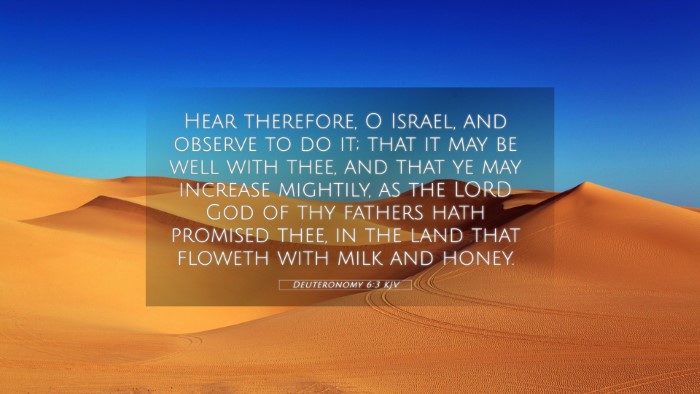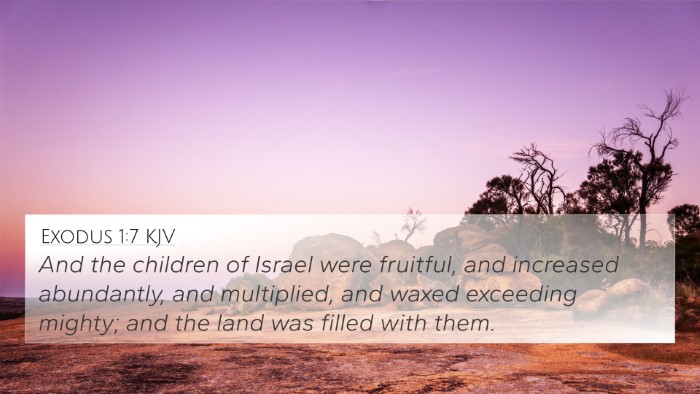Deuteronomy 6:3 - Meaning and Interpretation
Bible Verse: "Hear therefore, O Israel, and observe to do it; that it may be well with thee, and that ye may increase mightily, as the Lord God of thy fathers hath promised thee, in the land that floweth with milk and honey."
Overview
This verse serves as a critical reminder for the Israelites of the importance of obedience to God's commands. It emphasizes the blessings that come from listening and adhering to what God has instructed.
Summary of Commentary Insights
- Matthew Henry: Henry elaborates on the significance of “Hear,” suggesting that it is not merely about auditory acknowledgment but involves active obedience. He highlights that understanding and applying God's laws lead to well-being.
- Albert Barnes: Barnes focuses on the promise of prosperity in Canaan, linking it to the Israelites' commitment to God's directives. He interprets the phrase "that it may be well with thee" as a divine assurance of welfare contingent upon obedience.
- Adam Clarke: Clarke brings attention to the continuous aspect of the command, indicating that the Lord's promises are for those who consistently obey His statutes and teachings, ensuring harmony in their lives.
Key Themes in Deuteronomy 6:3
This verse connects to several broader biblical themes, including:
- Obedience to God: A foundational theme throughout the Bible, emphasizing that listening and acting on God's word brings blessings.
- Divine Promises: The assurance of God’s promises is a recurring motif, seen in the context of entering the Promised Land.
- Community and Collective Worship: The call is not just individual but communal, urging Israel as a whole to uphold God’s commands.
Cross-Referencing Related Verses
Deuteronomy 6:3 can be cross-referenced with the following biblical passages:
- Exodus 20:12 - "Honor your father and your mother, that your days may be long upon the land which the Lord your God is giving you." (Emphasizes the blessings linked to obedience).
- Deuteronomy 5:33 - "You shall walk in all the ways which the Lord your God has commanded you, that you may live and that it may be well with you..." (A direct reiteration of obedience leading to well-being).
- Joshua 1:8 - "This Book of the Law shall not depart from your mouth, but you shall meditate in it day and night..." (Connecting meditation on God's law to successful living).
- Psalm 1:1-3 - "Blessed is the man who walks not in the counsel of the wicked... He is like a tree planted by streams of water…” (Portrays the outcomes of obedience to God's laws).
- Proverbs 3:1-2 - "My son, do not forget my teaching, but let your heart keep my commandments, for length of days and years of life and peace they will add to you." (The fulfillment of promises through adherence to divine instruction).
- Isaiah 48:18 - "Oh, that you had heeded My commandments! Then your peace would have been like a river, and your righteousness like the waves of the sea." (A prophetic reminder of the blessings of compliance).
- John 14:15 - "If you love Me, keep My commandments." (In the New Testament, Jesus emphasizes the continuity of obedience).
- Romans 2:13 - "For not the hearers of the law are just in the sight of God, but the doers of the law will be justified." (Inter-testamental connection showing the requirement for action in faith).
The Importance of Cross-Referencing
Cross-referencing Bible verses enriches the understanding of scripture and allows for a more profound comprehension of God's message. By establishing connections between texts, believers can see themes and commands that resonate throughout the biblical narrative.
Tools for Effective Bible Cross-Referencing
Using resources like Bible concordances and cross-reference guides can significantly enhance one’s study. Below are some tools and methods:
- Bible Concordance: A comprehensive tool providing a list of words and phrases, making it easier to locate verses.
- Cross-Reference Bible Study:\strong> A method involving the comparison of various verses that share similar themes or teachings.
- Inter-Biblical Dialogue: Understanding connections between Old and New Testament writings enhances theological insights.
Conclusion
In summary, Deuteronomy 6:3 is a powerful exhortation for faithfulness and obedience among the people of Israel, promising them well-being and prosperity as a reward. Its implications stretch far beyond the historical context, anchoring themselves in the very essence of the Biblical covenant and applicable to believers today. Through diligent study and cross-referencing, one can delve deeper into the thematic elements interwoven in scripture and appreciate the overarching narrative of God’s promise and human responsibility.















